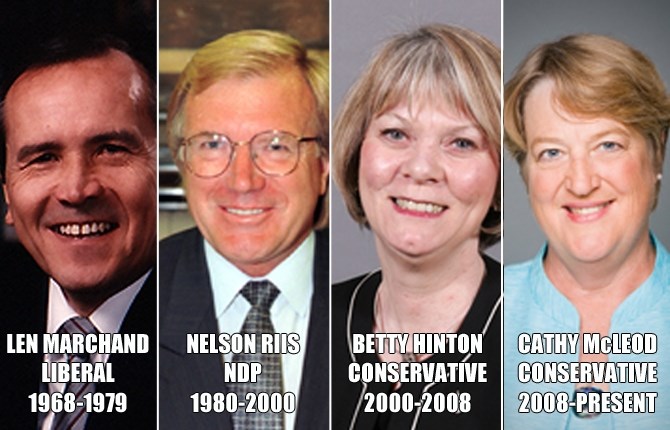
Nearly 50 years of riding history in the Kamloops-Thompson-Cariboo.
Image Credit: COMPILATION
October 13, 2015 - 8:00 PM
KAMLOOPS - Before voting for the governing party in the last ten years, Kamloops had a pattern of pushing against the status quo. But whether that’s in store for this election remains to be seen, according to one student researcher.
Steve O’Reilly, a fourth year history student at Thompson Rivers University, recently completed his study of election voting patterns in the area from 1983 to present day. Through his research he determined locals had a history of voting against the federal party in Ottawa, but when it came to provincial elections, the district would typically vote for the party leading the polls.
“We had this tendency to vote for parties that didn’t win the federal election,” he says. “I drew some conclusions that we were protesting the status quo in Ottawa and picking what we thought was the best vehicle to reject it."
That vehicle from 1980 to 2000 was New Democrat Nelson Riis, who O’Reilly says was always outspoken against the governing party in Ottawa.
“The toughest thing about representing our region is getting governments to understand what living here in Western Canada is all about. We are not like Ontario. Having to compete head-on with Ontario and American businesses without the same supports is simply not fair,” Riis said in a booklet delivered during his term.
A contentious issue during Riis’s term was the affect the North American Free Trade Agreement would have on B.C. lumber, O’Reilly says. Jobs were being cut along with trees, which became an election platform for local candidates. Interestingly, O’Reilly notes the Trans-Pacific Partnership hasn’t taken the same effect on local voters in the 2015 election.
While Riis spent two decades as the region’s member of Parliament, he was eventually replaced by Conservative candidate Betty Hinton in the 2000 election.
"In the 2000 election in Kamloops, Stockwell Day as well as other Canadian Alliance MPs were coming to Kamloops and bringing the case that the NDP doesn’t have the same voice in Ottawa,” O’Reilly says.
Since then, the district has continued to federally vote Conservative, first for Betty Hinton, then Cathy McLeod in 2008.
McLeod, who was relatively unknown in the city at the time took a leave from her nursing position with Interior Health to re-enter politics. Prior to pursuing a role as MP, McLeod worked in municipal politics, first as councillor then mayor of Pemberton.
Over McLeod’s term she served as a parliamentary secretary to ministers of labour, national revenue and most recently, health.
McLeod received over 50 per cent of the votes in the last election, O’Reilly says. He believes it’s likely she’ll be elected again on Oct. 19 based on those statistics.
"If she were to lose or another person to win it would most likely be the NDP,” he says.
THE RED DECADE
Prior to electing NDP in the 80s, the riding was Liberal from 1968 to 1979 with Len Marchand as MP. During Marchand’s term, the social and economical issues were different than today. The economy still demanded job creation but was a topic Marchand approached with jubilance.
"If there was an economic olympics, Canada would win the gold medal for performance!” he said in one of his many reports from Ottawa pamphlets.
As for social issues, separatism was a regular talking point. Marchand was against it, stating in another report from Ottawa: “I think maybe it is time for us in the West to think again about the question of Quebec separatism. I know there are people who say, 'let them go. Who needs Quebec?' As if Quebec were some foreign country. That kind of attitude, all I can say is: Quebec is part of my country, Canada, just as much a part as the Maritimes, or the Prairies, or the British Columbia Interior, or Tuktoyaktuk in the Northwest Territories."
To contact a reporter for this story, email Glynn Brothen at gbrothen@infonews.ca, or call 250-319-7494. To contact the editor, email mjones@infonews.ca or call 250-718-2724.
News from © iNFOnews, 2015